【趣味英语】春节小知识
中国传统节日英语知识
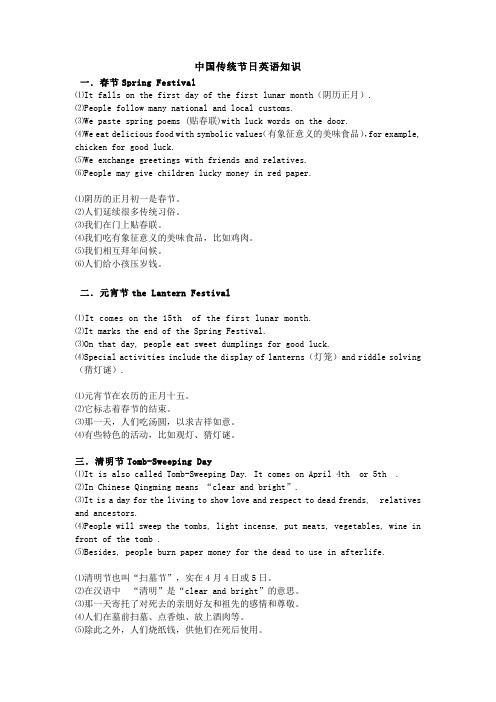
中国传统节日英语知识一.春节Spring Festival⑴It falls on the first day of the first lunar month(阴历正月).⑵People follow many national and local customs.⑶We paste spring poems (贴春联)with luck words on the door.⑷We eat delicious food with symbolic values(有象征意义的美味食品),for example, chicken for good luck.⑸We exchange greetings with friends and relatives.⑹People may give children lucky money in red paper.⑴阴历的正月初一是春节。
⑵人们延续很多传统习俗。
⑶我们在门上贴春联。
⑷我们吃有象征意义的美味食品,比如鸡肉。
⑸我们相互拜年问候。
⑹人们给小孩压岁钱。
二.元宵节the Lantern Festival⑴It comes on the 15th of the first lunar month.⑵It marks the end of the Spring Festival.⑶On that day, people eat sweet dumplings for good luck.⑷Special activities include the display of lanterns(灯笼)and riddle solving (猜灯谜).⑴元宵节在农历的正月十五。
⑵它标志着春节的结束。
⑶那一天,人们吃汤圆,以求吉祥如意。
⑷有些特色的活动,比如观灯、猜灯谜。
三.清明节Tomb-Sweeping Day⑴It is also called Tomb-Sweeping Day. It comes on April 4th or 5th .⑵In Chinese Qingming means “clear and bright”.⑶It is a day for the living to show love and respect to dead frends, relatives and ancestors.⑷People will sweep the tombs, light incense, put meats, vegetables, wine in front of the tomb .⑸Besides, people burn paper money for the dead to use in afterlife.⑴清明节也叫“扫墓节”,实在4月4日或5日。
春节英语介绍简短5句小学

春节英语介绍简短春节是中国最重要的传统节日,也称为农历新年。
它是中国人民最喜欢和盛大的节日之一。
春节通常在农历的正月初一,也就是公历的一月或二月份庆祝。
下面是关于春节的五句简短英语介绍。
1. Spring Festival春节被称为Spring Festival是因为它标志着冬季的结束和春季的到来。
人们庆祝这个节日的时候,家家户户都会打扫房屋,贴春联,挂红灯笼,燃放鞭炮,以及享用美食。
这些活动象征着新的一年的开始和祝福。
2. Family Reunion春节是一个非常重要的家庭团聚的时刻。
在这个时候,远在外地工作或学习的人们会回家和他们的家人团聚,共度佳节。
家人们会一起吃饭、唱歌、跳舞、观看春晚等等,共庆新的一年的到来。
3. Traditional Customs春节有许多传统的习俗。
其中包括给长辈拜年,穿红色的衣服,发红包,放鞭炮,拜祭祖先,以及挂对联等。
每个习俗都有着特殊的意义和象征,人们通过这些习俗来祈福、祈求好运和健康。
4. Year of the [Animal]每一年的农历都有一个动物来象征这一年。
这个动物是中国十二生肖中的一个,比如鼠年、牛年、虎年等等。
人们相信每一个生肖代表着不同的特征和运势。
每当进入一个新的生肖年,人们会相信会有不同的机遇和挑战。
5. Celebration and Festivities春节的庆祝活动持续了15天,直到元宵节结束。
在这期间,人们会举行大型的庆祝活动,如花市、灯笼展、舞龙舞狮表演、烟火晚会等。
这些庆祝活动充满了欢乐和喜庆气氛,吸引了很多中国人及外国游客的参与。
这是关于春节的五句简短英语介绍。
春节是中国文化中最盛大的节日之一,它不仅是一个家庭团聚的时刻,也是一个充满欢乐和庆祝活动的时刻。
通过这些介绍,我们可以更好地了解并分享中国春节文化的魅力和独特之处。
春节的英文知识
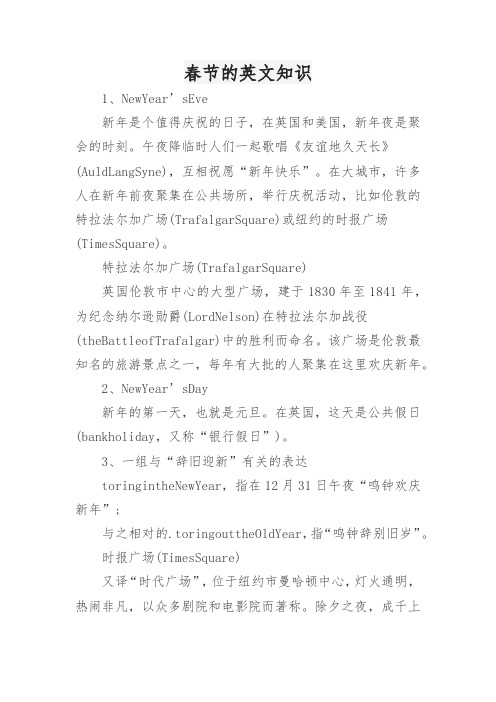
春节的英文知识1、NewYear’sEve新年是个值得庆祝的日子,在英国和美国,新年夜是聚会的时刻。
午夜降临时人们一起歌唱《友谊地久天长》(AuldLangSyne),互相祝愿“新年快乐”。
在大城市,许多人在新年前夜聚集在公共场所,举行庆祝活动,比如伦敦的特拉法尔加广场(TrafalgarSquare)或纽约的时报广场(TimesSquare)。
特拉法尔加广场(TrafalgarSquare)英国伦敦市中心的大型广场,建于1830年至1841年,为纪念纳尔逊勋爵(LordNelson)在特拉法尔加战役(theBattleofTrafalgar)中的胜利而命名。
该广场是伦敦最知名的旅游景点之一,每年有大批的人聚集在这里欢庆新年。
2、NewYear’sDay新年的第一天,也就是元旦。
在英国,这天是公共假日(bankholiday,又称“银行假日”)。
3、一组与“辞旧迎新”有关的表达toringintheNewYear,指在12月31日午夜“鸣钟欢庆新年”;与之相对的.toringouttheOldYear,指“鸣钟辞别旧岁”。
时报广场(TimesSquare)又译“时代广场”,位于纽约市曼哈顿中心,灯火通明,热闹非凡,以众多剧院和电影院而著称。
除夕之夜,成千上万人聚集在这里迎接新年。
时报广场因时报大楼而得名,它曾是《纽约时报》(TheNewYorkTimes)的办公场所。
4、NewYear’sresolution新年决心人们常希望新年能给生活带来好的变化。
有些人会特别许下诺言,希望能改进个人的某些行为举止或戒除坏习惯,如减肥、戒烟。
这样的诺言称为“新年决心”。
但大多数人坚持不了多久就无果而终了。
例:HaveyoumadeanyNewYear’sresolution?你有什么新年计划吗?5、Hogmanay(苏格兰12月31日的)除夕以及除夕欢庆活动Hogmanay在苏格兰是一项很重要的庆祝活动,人们对它的重视程度甚至超过圣诞节。
春节有关的英文单词

春节有关的英文单词
春节(Chinese New Year),又称农历新年(Lunar New Year)或春节晚会(Spring Festival Gala),是中国传统的重要节日。
这个节日通常在农历年的正月初一庆祝,在全国各地都有独特的庆祝方式和习俗。
以下是一些与春节相关的英语单词。
1. Spring Festival:春节,又称为Chinese New Year。
2. Reunion dinner:团圆饭,是指在春节前夕,家人齐聚一堂共进晚餐的传统。
3. Red envelope:红包,是给孩子和晚辈的春节礼物,里面装有一定金额的现金。
4. Firecracker:鞭炮,这是春节庆祝的必备道具之一。
5. Lion dance:舞狮,是一种表演形式,通常在春节期间的庆祝活动中出现。
6. Lantern Festival:元宵节,是春节之后的第一个重要节日,通常在农历正月十五
庆祝。
7. Zodiac animal:生肖动物,每一年都代表了一个生肖动物,例如今年是金属牛年。
8. New Year's Eve:除夕,是指农历年的最后一天,也是春节的前夜。
9. Spring couplet:春联,一种传统的中国绘画艺术,通常挂在门口以迎接新年的到来。
10. Festival decorations:节日装饰,包括各种颜色鲜艳的花卉、灯笼和各种装饰品。
以上是一些与春节相关的英文单词。
春节这个传统的中国节日已经在全球范围内受到广泛的关注和认同,也希望能够通过这些单词,让更多的人了解和感受到中国的文化魅力。
春节文化知识英文版

春节文化知识英文版The Spring Festival, also known as Chinese New Year, is one of the most important and widely celebrated festivals in Chinese culture. 春节,又称为中国新年,是中国文化中最重要和广泛庆祝的节日之一。
It is a time when families come together to celebrate and usher in the new year. 这是一个家人团聚,共同庆祝迎接新年的时刻。
The festival lasts for 15 days, starting from the first day of the lunar calendar and culminating in the Lantern Festival on the 15th day. 这个节日持续15天,从农历的第一天开始,一直到第15天的元宵节。
During this time, there are various customs and traditions that are observed to bring good luck and prosperity for the coming year. 在这段时间里,人们会遵循各种习俗和传统,以期带来新一年的好运和繁荣。
One of the most important customs is the reunion dinner on the eve of the new year, where families gather to enjoy a sumptuous meal together. 最重要的习俗之一是新年前夜的团圆饭,家人聚在一起享受丰盛的晚餐。
Another popular tradition is the giving of red envelopes (hongbao) containing money to children and unmarried adults as a gesture of good fortune. 另一个流行的传统是给孩子和未婚成年人发放装有钱的红包,表示祝福。
过年英语知识点总结

过年英语知识点总结1. History of Chinese New YearThe Chinese New Year has a long history that dates back to ancient times. According to historical records, the festival originated thousands of years ago during the Shang Dynasty (1600-1046 BC) in China. At that time, the festival was called "Yuan Dan" and was celebrated as the beginning of a new year. However, the customs and traditions of the festival have evolved over time, and eventually, it became a time to celebrate the arrival of spring and the hope for a prosperous year ahead.2. Traditions and CustomsThere are many traditions and customs associated with the Chinese New Year, each with its own unique significance. Some of the most common traditions and customs include:- Spring cleaning: Before the Chinese New Year, it is customary for people to thoroughly clean their homes to sweep away bad luck and make room for good luck to enter. This tradition is believed to bring good fortune in the new year.- Reunion dinner: On the eve of the Chinese New Year, families gather for a lavish dinner to celebrate the coming of a new year and to wish each other well. The meal typically includes various traditional dishes, such as fish, dumplings, and nian gao (sticky rice cake).- Red decorations: Red is the dominant color of the Chinese New Year, as it is believed to bring good luck and ward off evil spirits. People decorate their homes with red lanterns, couplets, and other red items to create a festive atmosphere.- Giving red envelopes: During the Chinese New Year, it is customary for adults to give red envelopes (hongbao) containing money to children and unmarried young adults as a symbol of good luck and prosperity.- Lion and dragon dances: These traditional performances are an integral part of the Chinese New Year celebrations. They are believed to bring good luck and ward off evil spirits.3. SuperstitionsThe Chinese New Year is also a time when people pay special attention to superstitions and taboos in order to avoid bad luck and attract good fortune. Some common superstitions and taboos during the Chinese New Year include:- Avoiding cleaning and sweeping on the first day of the new year, as it is believed that this may sweep away good luck.- Refraining from using sharp objects, such as knives and scissors, as they are believed to cut off good fortune and bring bad luck.- Not breaking anything, as it is believed to bring bad luck and financial loss.- Avoiding discussing topics related to death, illness, or other negative events, as they may bring bad luck.4. Food and DishesFood plays a crucial role in Chinese New Year celebrations, with many traditional dishes and snacks that hold special meanings and symbolism. Some popular Chinese New Year foods and their significance include:- Fish: The Chinese word for fish, "yu," sounds similar to the word for surplus or abundance, symbolizing prosperity and abundance in the new year.- Nian gao: This sticky rice cake is a symbol of achieving higher success and progress in the coming year.- Dumplings: These traditional Chinese delicacies are filled with different ingredients and are shaped like ancient Chinese coins, symbolizing wealth and prosperity.- Spring rolls: These crispy, golden rolls represent wealth and prosperity due to their resemblance to gold bars.In conclusion, the Chinese New Year is a festival filled with rich traditions, customs, and superstitions that date back thousands of years. It is a time for family reunions, cultural celebrations, and the hope for a prosperous new year. By understanding the history, traditions, and symbolism of the Chinese New Year, we can gain a deeper appreciation for this important festival and learn more about Chinese culture and traditions.。
与春节相关的英语表达

2024年的春节到了,我们在欢度佳节的同时也可以学习英语。
下面分享一些与春节有关的英语知识。
春节(Spring Festival)春节习俗:过年(guònián) - Celebrate the New Year中国人过年时会进行各种庆祝活动。
Chinese people celebrate the New Year with various festive activities.包饺子(bāo jiǎozi) - Make dumplings包饺子是中国人过年时的传统习俗。
Making dumplings is a traditional custom for Chinese people during the New Year.拜年(bài nián) - Pay New Year's visit中国人过年时会互相拜年,送去新年祝福。
Chinese people visit each other and exchange New Year's greetings during the New Year.放鞭炮(fàng biānpào) - Set off firecrackers放鞭炮是中国人春节时传统的习俗之一。
Setting off firecrackers is one of the traditional customs for Chinese people during the Spring Festival.舞狮舞龙(wǔshīwǔlóng) - Lion and dragon dances舞狮舞龙是中国春节时常见的民间表演。
Lion and dragon dances are common folk performances during the Chinese Spring Festival.红包(hóngbāo) - Red envelopes长辈会给小孩压岁钱,放在红包里。
春节英语知识点总结小报

春节英语知识点总结小报1. The Date of Spring FestivalThe date of Spring Festival varies each year as it follows the lunar calendar. It usually falls between January 21 and February 20. The festival lasts for 15 days, starting from the first day of the lunar new year and ending with the Lantern Festival.2. Traditional CustomsDuring Spring Festival, people engage in various traditional customs to bring good luck and prosperity for the coming year. This includes thorough cleaning of homes to sweep away bad luck, decorating with red lanterns and couplets to symbolize good fortune, and giving red envelopes filled with money to children and unmarried adults.3. Reunion DinnerThe reunion dinner, also known as “Nian Ye Fan”, is one of the most important parts of Spring Festival. Families gather together on the eve of the lunar new year to enjoy a lavish feast, symbolizing unity and abundance. The dinner often includes special dishes with symbolic meanings, such as fish for surplus and long noodles for longevity.4. Fireworks and Dragon DancesFireworks and dragon dances are popular activities during Spring Festival. The loud sounds of fireworks are believed to ward off evil spirits, while the dragon dance is performed to bring good luck and prosperity. These colorful displays are a highlight of the festival, especially in large cities and rural areas.5. Travel RushSpring Festival is also known as the largest annual human migration in the world, as millions of people travel home to reunite with their families. This massive travel rush, known as “Chunyun”, creates significant transportation challenges and overcrowded train stations and airports.6. Zodiac AnimalsEach year in the lunar calendar is associated with one of the twelve zodiac animals. This includes the rat, ox, tiger, rabbit, dragon, snake, horse, goat, monkey, rooster, dog, and pig. The zodiac animal for each year is believed to influence a person’s personality and destiny.7. Red DecorationsRed is the main color of Spring Festival and is believed to bring good luck and drive away evil spirits. Red lanterns, posters, and clothing are commonly seen during the festival. This vibrant color is a symbol of joy, prosperity, and happiness in Chinese culture.8. GreetingsDuring Spring Festival, people exchange greetings and blessings to offer good wishes for the new year. Common phrases include “Xin Nian Kuai Le” (Happy New Year) and “Gong Xi Fa Cai” (Wishing you prosperity). These greetings are often accompanied by gifts, such as traditional snacks and fruits.9. Festival FoodsThere are many traditional foods associated with Spring Festival, each with its own symbolic meaning. Some popular dishes include dumplings, which represent wealth and prosperity, and glutinous rice cakes, which symbolize a higher position and the growth of children.10. Lantern FestivalThe Lantern Festival marks the end of Spring Festival and is celebrated on the fifteenth day of the lunar new year. It is a time for colorful lantern displays, lion and dragon dances, and eating sweet rice dumplings. The festival is a joyful conclusion to the holiday season.In conclusion, Spring Festival is a time of joy and celebration for Chinese people around the world. It is a time for family, tradition, and renewal, as people welcome the arrival of the new year with hope and optimism. Understanding the key points of this important holiday can help us appreciate the rich cultural heritage and customs of this ancient festival.。
春节知识英文介绍
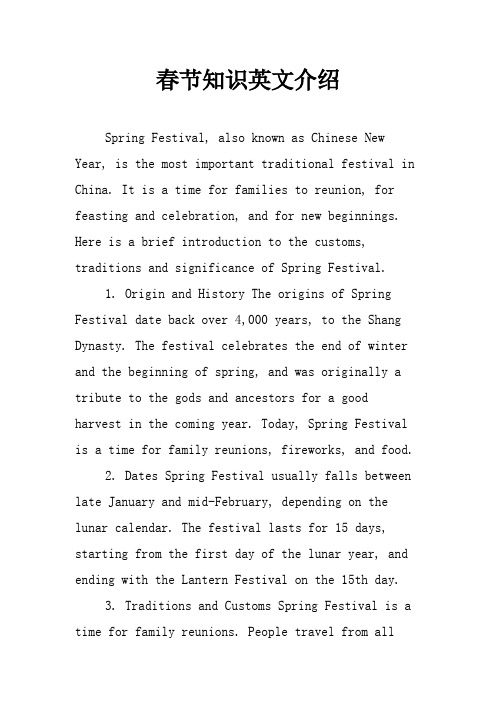
春节知识英文介绍Spring Festival, also known as Chinese New Year, is the most important traditional festival in China. It is a time for families to reunion, for feasting and celebration, and for new beginnings. Here is a brief introduction to the customs, traditions and significance of Spring Festival.1. Origin and History The origins of Spring Festival date back over 4,000 years, to the Shang Dynasty. The festival celebrates the end of winter and the beginning of spring, and was originally a tribute to the gods and ancestors for a good harvest in the coming year. Today, Spring Festival is a time for family reunions, fireworks, and food.2. Dates Spring Festival usually falls between late January and mid-February, depending on the lunar calendar. The festival lasts for 15 days, starting from the first day of the lunar year, and ending with the Lantern Festival on the 15th day.3. Traditions and Customs Spring Festival is a time for family reunions. People travel from allparts of the country to be with their families for the New Year. Red decorations are put up all around the home, and gifts of money in red envelopes are given to children and unmarried adults. Fireworks, dragon and lion dances, and a range of traditional performances are also part of the festivities.4. Food Food plays a central role in Spring Festival celebrations. Families prepare a range of traditional dishes, including dumplings, fish, rice cakes, and other delicacies. Dumplings are especially important, as they symbolize wealth and good fortune in the New Year.5. Superstitions There are many superstitions associated with Spring Festival. For example, it is considered bad luck to sweep your house during the first three days of the New Year, as you may sweep away your good fortune. Similarly, it is considered unlucky to wash your hair on New Year's Day, as you may wash away your good luck.6. Significance Spring Festival is an important time for reflection and renewal. It is a time to say farewell to the old and welcome the new. Thefestival is also a time for families to come together and celebrate their heritage and traditions.In conclusion, the Spring Festival is an important cultural event in China, and a time for family reunions, feasting, and celebration. The customs and traditions associated with Spring Festival serve as reminders of the rich cultural heritage of China, and the importance of family and community in Chinese society.。
关于春节的英语词

关于春节的英语词春节是中国最重要的传统节日,也是世界上最盛大的庆祝活动之一。
在春节期间,人们会展开各种各样的庆祝活动,如家庭聚餐、赏花灯、放烟火、舞狮舞龙等。
以下是一些关于春节的英语词汇,让我们一起来了解一下吧。
1. Spring Festival春节的英文名称为Spring Festival,它源于中国的传统文化和农历,一般在农历正月初一开始,持续十五天,直到正月十五元宵节结束。
在春节期间,人们会进行各种庆祝活动,如贴春联、吃团圆饭、放鞭炮等。
2. Lunar New Year春节也被称为Lunar New Year,即阴历新年。
中国采用农历,而非公历,因此春节并不是每年的1月1日,而是在农历正月初一这一天。
此外,许多亚洲国家也会庆祝Lunar New Year,如越南、韩国、新加坡等。
3. Red Envelope红包是春节期间的一项传统习俗,也是孩子们最期待的节日礼物之一。
在春节期间,长辈会给晚辈发红包,里面装有一定金额的钱。
红色代表着吉祥和幸运,在中国文化中是非常重要的颜色。
4. Reunion Dinner春节的重要活动之一是家庭聚餐,通常在除夕晚上进行。
这顿团圆饭是家庭成员共同庆祝的时刻,也是一年中大家最期待的晚餐。
在这一天,人们会准备各种美食,如饺子、年糕、鱼等。
5. Dragon Dance舞龙是春节期间的另一项传统活动。
龙在中国文化中代表着权力、好运和祥瑞。
在舞龙表演中,人们会穿着龙装,手持长竿,上下跳跃,模仿龙的动作。
这是一项非常受欢迎的活动,吸引了大量观众。
6. Lion Dance舞狮是春节期间的另一项传统活动,与舞龙类似。
在舞狮表演中,人们会穿着狮子装,模仿狮子的动作,跳跃、扭动。
狮子在中国文化中也是一个重要的象征,代表着勇气和力量。
7. Lantern Festival元宵节是春节期间的最后一个节日,也是一个非常重要的节日。
在这一天,人们会放烟火、吃元宵、赏花灯等。
花灯是元宵节的重要元素之一,人们会在这一天点亮各种各样的花灯,如花灯龙、花灯狮、花灯船等。
关于春节的英文知识
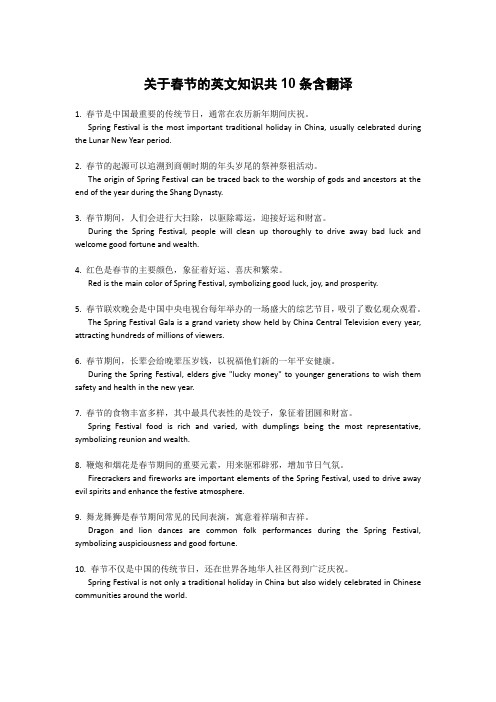
关于春节的英文知识共10条含翻译1. 春节是中国最重要的传统节日,通常在农历新年期间庆祝。
Spring Festival is the most important traditional holiday in China, usually celebrated during the Lunar New Year period.2. 春节的起源可以追溯到商朝时期的年头岁尾的祭神祭祖活动。
The origin of Spring Festival can be traced back to the worship of gods and ancestors at the end of the year during the Shang Dynasty.3. 春节期间,人们会进行大扫除,以驱除霉运,迎接好运和财富。
During the Spring Festival, people will clean up thoroughly to drive away bad luck and welcome good fortune and wealth.4. 红色是春节的主要颜色,象征着好运、喜庆和繁荣。
Red is the main color of Spring Festival, symbolizing good luck, joy, and prosperity.5. 春节联欢晚会是中国中央电视台每年举办的一场盛大的综艺节目,吸引了数亿观众观看。
The Spring Festival Gala is a grand variety show held by China Central Television every year, attracting hundreds of millions of viewers.6. 春节期间,长辈会给晚辈压岁钱,以祝福他们新的一年平安健康。
During the Spring Festival, elders give "lucky money" to younger generations to wish them safety and health in the new year.7. 春节的食物丰富多样,其中最具代表性的是饺子,象征着团圆和财富。
春节的文化知识英文
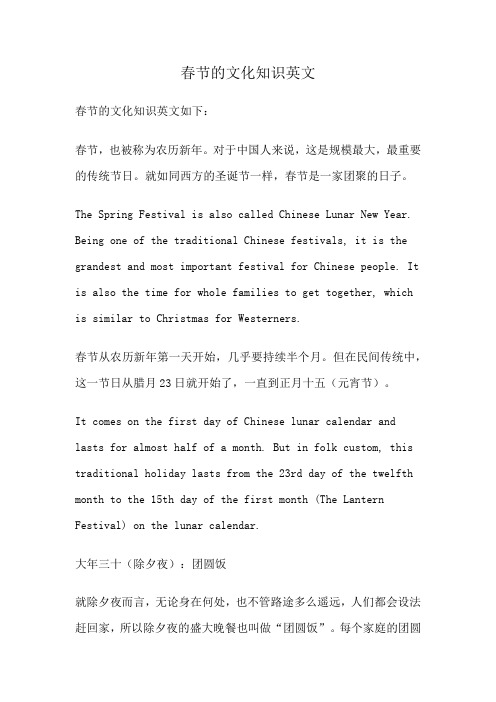
春节的文化知识英文春节的文化知识英文如下:春节,也被称为农历新年。
对于中国人来说,这是规模最大,最重要的传统节日。
就如同西方的圣诞节一样,春节是一家团聚的日子。
The Spring Festival is also called Chinese Lunar New Year. Being one of the traditional Chinese festivals, it is the grandest and most important festival for Chinese people. It is also the time for whole families to get together, which is similar to Christmas for Westerners.春节从农历新年第一天开始,几乎要持续半个月。
但在民间传统中,这一节日从腊月23日就开始了,一直到正月十五(元宵节)。
It comes on the first day of Chinese lunar calendar and lasts for almost half of a month. But in folk custom, this traditional holiday lasts from the 23rd day of the twelfth month to the 15th day of the first month (The Lantern Festival) on the lunar calendar.大年三十(除夕夜):团圆饭就除夕夜而言,无论身在何处,也不管路途多么遥远,人们都会设法赶回家,所以除夕夜的盛大晚餐也叫做“团圆饭”。
每个家庭的团圆饭都是一年中精心准备的最华丽和隆重的家宴。
女主人在餐桌上摆满精心准备的食物,全家人围坐一起分享美味佳肴,然后一起乐融融地包饺子。
午夜12点,每个家庭都会放鞭炮,辞旧迎新。
春节习俗的英文资料整理

让知识带有温度。
春节习俗的英文资料整理春节习俗的英文资料春节习俗的`英文资料Chinese New Year or Spring Festival is the most important of the traditional Chinese holidays. It is sometimes called the Lunar New Year by English speakers. The festival traditionally begins on the first day of the first month (Chinese: 正月; pinyin: zhēng yuè) in the Chinese calendar and ends on the 15th; this day is called Lantern Festival. Chinese New Years Eve is known as chú xī. It literally means Year-pass Eve.Chinese New Year is the longest and most important festivity in the Lunar Calendar. The origin of Chinese New Year is itself centuries old and gains significance because of several myths and traditions. Ancient Chinese New Year is a reflection on how the people behaved and what they believed in the most.Celebrated in areas with large populations of ethnic Chinese, Chinese New Year is considered a major holiday for the Chinese and has had influence on the new year celebrations of its geographic neighbors, as well as cultures with whom the Chinese have had extensive interaction. These include Koreans (Seollal), Tibetans and Bhutanese (Losar), Mongolians (Tsagaan Sar), Vietnamese (Tt), and formerly the Japanese before 1873 (Oshogatsu). Outside of Mainland China, Hong Kong, Macau, and Taiwan, Chinese New Year is also celebrated in countries with significant Han Chinese populations, such as Singapore, Indonesia, Laos, Malaysia, the Philippines, and Thailand. In countries such as Australia, Canada and the United States, although Chinese New Year is not an official holiday, many ethnic Chinese hold large celebrations and第1页/共2页千里之行,始于足下。
文化课堂 春节的英文知识

春节,也被称为中国新年,是中华民族最重要的传统节日之一。
这一节日的英文是:“Chinese New Year” 或“Lunar New Year”。
下面是一些与春节相关的英文知识和表达:1.春节的起源:春节起源于上古时代的岁首祈岁祭祀,由此演变而来。
The origin of the Spring Festival can be traced back to the ancient era, when it was a time for sacrifice and prayers at the beginning of the year.2.春节的习俗:春节有许多传统习俗,如贴春联(posting Spring Festival couplets)、放鞭炮(setting off fireworks)、拜年(paying New Year's visits)、吃团圆饭(having a reunion dinner)等。
3.春节的食物:春节期间,人们通常会吃年糕(New Year's cake)、饺子(jiaozi)、汤圆(tangyuan)等具有象征意义的食物。
4.春节的意义:春节不仅仅是一个节日,它更是中华民族的文化象征,代表着团圆、和谐、吉祥和富裕。
The Spring Festival is not just a holiday, but also a cultural symbol of the Chinese nation, representing unity, harmony, good luck, and prosperity.5.春节的英文祝福:在春节期间,人们可以用英文向朋友和家人发送祝福,如:“Wishing you a happy and prosperous Chinese New Year!” 或“Happy Lunar New Year! May all your wishes come true!”6.春节的英文名称:虽然春节在英文中通常被称为“Chinese New Year”,但在一些国家和地区,如新加坡和马来西亚,它也被称为“Lunar New Year”,因为这一节日是基于农历而非公历来庆祝的。
与春节有关的 英语
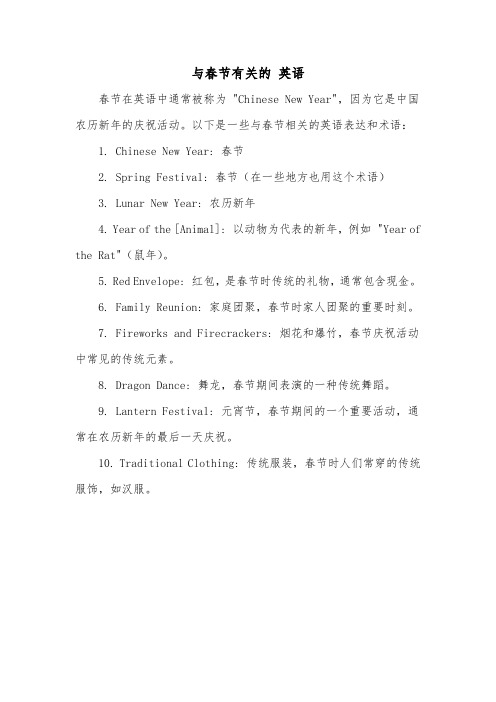
与春节有关的英语
春节在英语中通常被称为 "Chinese New Year",因为它是中国农历新年的庆祝活动。
以下是一些与春节相关的英语表达和术语:
1. Chinese New Year: 春节
2. Spring Festival: 春节(在一些地方也用这个术语)
3. Lunar New Year: 农历新年
4. Year of the [Animal]: 以动物为代表的新年,例如 "Year of the Rat"(鼠年)。
5. Red Envelope: 红包,是春节时传统的礼物,通常包含现金。
6. Family Reunion: 家庭团聚,春节时家人团聚的重要时刻。
7. Fireworks and Firecrackers: 烟花和爆竹,春节庆祝活动中常见的传统元素。
8. Dragon Dance: 舞龙,春节期间表演的一种传统舞蹈。
9. Lantern Festival: 元宵节,春节期间的一个重要活动,通常在农历新年的最后一天庆祝。
10. Traditional Clothing: 传统服装,春节时人们常穿的传统服饰,如汉服。
与春节习俗有关的英语词汇
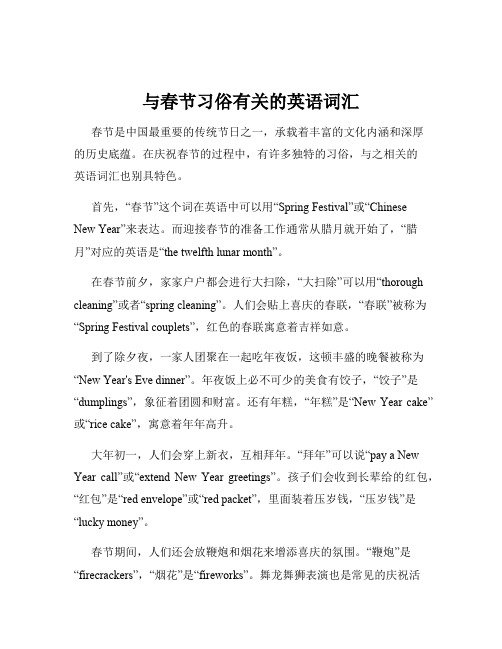
与春节习俗有关的英语词汇春节是中国最重要的传统节日之一,承载着丰富的文化内涵和深厚的历史底蕴。
在庆祝春节的过程中,有许多独特的习俗,与之相关的英语词汇也别具特色。
首先,“春节”这个词在英语中可以用“Spring Festival”或“Chinese New Year”来表达。
而迎接春节的准备工作通常从腊月就开始了,“腊月”对应的英语是“the twelfth lunar month”。
在春节前夕,家家户户都会进行大扫除,“大扫除”可以用“thorough cleaning”或者“spring cleaning”。
人们会贴上喜庆的春联,“春联”被称为“Spring Festival couplets”,红色的春联寓意着吉祥如意。
到了除夕夜,一家人团聚在一起吃年夜饭,这顿丰盛的晚餐被称为“New Year's Eve dinner”。
年夜饭上必不可少的美食有饺子,“饺子”是“dumplings”,象征着团圆和财富。
还有年糕,“年糕”是“New Year cake”或“rice cake”,寓意着年年高升。
大年初一,人们会穿上新衣,互相拜年。
“拜年”可以说“pay a New Year call”或“extend New Year greetings”。
孩子们会收到长辈给的红包,“红包”是“red envelope”或“red packet”,里面装着压岁钱,“压岁钱”是“lucky money”。
春节期间,人们还会放鞭炮和烟花来增添喜庆的氛围。
“鞭炮”是“firecrackers”,“烟花”是“fireworks”。
舞龙舞狮表演也是常见的庆祝活动,“舞龙”是“dragon dance”,“舞狮”是“lion dance”,精彩的表演吸引着众多观众。
在一些地方,还有逛庙会的习俗。
“庙会”可以用“temple fair”来表示,庙会上有各种小吃、手工艺品和娱乐活动。
此外,“灯笼”是“lantern”,春节期间会挂上红灯笼来营造节日气氛。
趣味学英语(20):初一到十五 春节习俗知多少
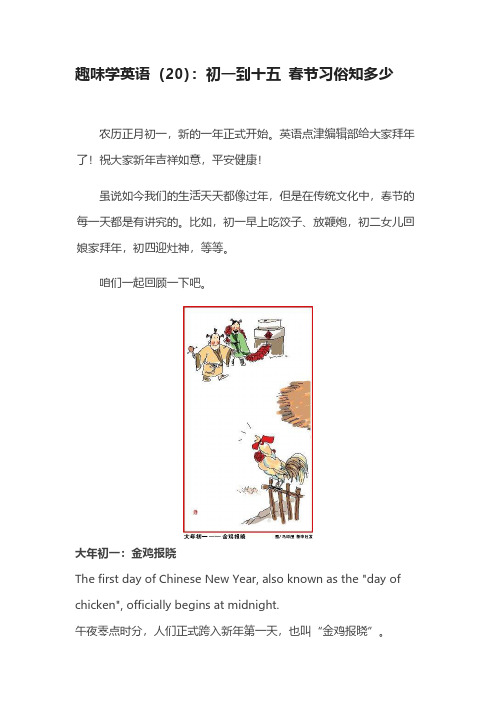
趣味学英语(20):初一到十五春节习俗知多少农历正月初一,新的一年正式开始。
英语点津编辑部给大家拜年了!祝大家新年吉祥如意,平安健康!虽说如今我们的生活天天都像过年,但是在传统文化中,春节的每一天都是有讲究的。
比如,初一早上吃饺子、放鞭炮,初二女儿回娘家拜年,初四迎灶神,等等。
咱们一起回顾一下吧。
大年初一:金鸡报晓The first day of Chinese New Year, also known as the "day of chicken", officially begins at midnight.午夜零点时分,人们正式跨入新年第一天,也叫“金鸡报晓”。
It is traditional to light firecrackers and make as much of a din as possible to chase off the evil monster nian.传统习俗是,人们会燃放鞭炮,尽可能制造大的喧闹声赶走邪恶的妖怪“年”。
Most importantly the oldest and most senior members are visited with the visits strengthening family kinship.最重要的习俗是,人们会拜访家中最年长的长辈,以加强家人之间的亲情。
Senior members of the family hand out red envelopes containing cash (Chinese: ya sui qian), a form of blessing and to suppress aging and the challenges of the coming year, to junior members of the family, mostly children and teenagers.而家中的长辈会给晚辈(主要是儿童和青少年)红包(中国人称之压岁钱),代表着对晚辈的祝福,也是祈祷自己在来年身体康健、万事如意。
春节的英文介绍
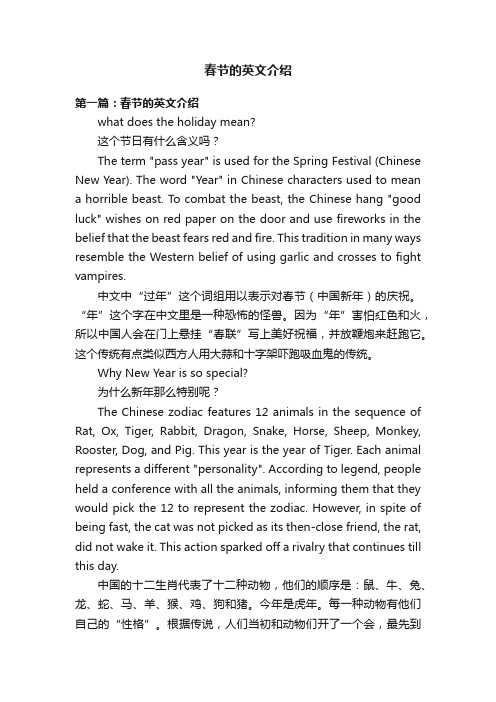
春节的英文介绍第一篇:春节的英文介绍what does the holiday mean?这个节日有什么含义吗?The term "pass year" is used for the Spring Festival (Chinese New Year). The word "Year" in Chinese characters used to mean a horrible beast. To combat the beast, the Chinese hang "good luck" wishes on red paper on the door and use fireworks in the belief that the beast fears red and fire. This tradition in many ways resemble the Western belief of using garlic and crosses to fight vampires.中文中“过年”这个词组用以表示对春节(中国新年)的庆祝。
“年”这个字在中文里是一种恐怖的怪兽。
因为“年”害怕红色和火,所以中国人会在门上悬挂“春联”写上美好祝福,并放鞭炮来赶跑它。
这个传统有点类似西方人用大蒜和十字架吓跑吸血鬼的传统。
Why New Year is so special?为什么新年那么特别呢?The Chinese zodiac features 12 animals in the sequence of Rat, Ox, Tiger, Rabbit, Dragon, Snake, Horse, Sheep, Monkey, Rooster, Dog, and Pig. This year is the year of Tiger. Each animal represents a different "personality". According to legend, people held a conference with all the animals, informing them that they would pick the 12 to represent the zodiac. However, in spite of being fast, the cat was not picked as its then-close friend, the rat, did not wake it. This action sparked off a rivalry that continues till this day.中国的十二生肖代表了十二种动物,他们的顺序是:鼠、牛、兔、龙、蛇、马、羊、猴、鸡、狗和猪。
有关春节习俗英文介绍
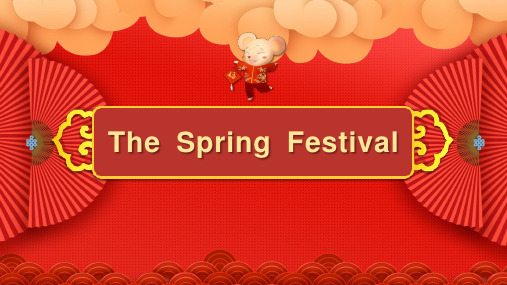
02 Customs of the Spring Festival
1. The spring festival transportation (春运)
提起春运,人们首先出现在脑海的印象就是人 多拥挤,票难买 When it comes to Spring Festival travel, the first thing that comes to mind is that people are crowded and tickets are hard to buy.
There are many legends about the origin of the Spring Festival. One legend goes that there was an extremely cruel beast named “Nian”, which had a very big mouth that would hurt people once a year on the new year eve. People were very scared.
In addition to pasting paper-cuts on windows, it is common for Chinese to paste the character “fu(福)”on walls or doors. “Fu” shows people’s yearning toward a good life. Some people even invert the character “fu” means "fu" arrive in Chinese.
3. Sweeping the Dust(扫尘)
“Dust” is homophonic with “chen”( 尘 )in Chinese , which means old and past. This custom shows a good wish of putting away old things to welcome a new life. Before the New Year comes, people will completely clean the inside and outside of their house.
- 1、下载文档前请自行甄别文档内容的完整性,平台不提供额外的编辑、内容补充、找答案等附加服务。
- 2、"仅部分预览"的文档,不可在线预览部分如存在完整性等问题,可反馈申请退款(可完整预览的文档不适用该条件!)。
- 3、如文档侵犯您的权益,请联系客服反馈,我们会尽快为您处理(人工客服工作时间:9:00-18:30)。
【趣味英语】春节小知识除夕夜,【每日英语】祝大家新年快乐,万事如意!【基本词汇与短语】:【Greeting Season】:春节The Spring Festival 农历lunar calendar正月lunar January; the first month by lunar calendar除夕New Year‘s Eve; eve of lunar New Year初一the beginning of New Year 元宵节The Lantern Festival【Customs】:过年Guo-nian; have the Spring Festival对联poetic couplet: two successive rhyming lines in poetry春联Spring Festival couplets 剪纸paper-cuts买年货special purchases for the Spring Festival ; do Spring Festival shopping年画New Year paintings 敬酒propose a toast灯笼lantern: a portable light 烟花fireworks爆竹firecrackers (People scare off evil spirits and ghosts with the loud pop.)红包red packets (cash wrapped up in red paper, symbolize fortune and wealth in the coming year.)舞狮lion dance (The lion is believed to be able to dispel evil and bring good luck.)舞龙dragon dance (to expect good weather and good harvests)戏曲traditional opera 杂耍variety show; vaudeville灯谜riddles written on lanterns 灯会exhibit of lanterns守岁staying-up 禁忌taboo拜年pay New Year‘s call; give New Year‘s greetings; New Year‘s visit去晦气get rid of the ill- fortune祭祖宗offer sacrifices to one‘s ancestors压岁钱gift money; money given to children as a lunar New Year gift【Culture Note】:In the old days, New Year‘s money was given in the form of one hundred copper coins strung together on a red string and symbolized the hope that one would live to be a hundred years old. Today, money is placed inside red envelopes in denominations considered auspicious and given to represent luck and wealth辞旧岁bid farewell to the old year扫房spring cleaning; general house-cleaning【Food names】:年糕Nian-gao; rise cake; New Year cake团圆饭family reunion dinner 年夜饭the dinner on New Year‘s Eve饺子Jiao-zi; Chinese meat ravioli 八宝饭eight treasures rice pudding汤圆Tang-yuan; dumplings made of sweet rice, rolled into balls and stuffed with either sweet or spicy fillings糖果盘candy tray: 什锦糖assorted candies - sweet and fortune蜜冬瓜candied winter melon - growth and good health西瓜子red melon seed - joy, happiness, truth and sincerity金桔cumquat - prosperity 红枣red dates - prosperity糖莲子candied lotus seed - many descendents to come糖藕candied lotus root - fulfilling love relationship花生糖peanut candy - sweet【Blessing】:Treasures fill the home 财源广进Business flourishes 事业兴隆Peace all year round 岁岁平安Wishing you prosperity 恭喜发财Harmony brings wealth 家和万事兴May all your wishes come true 心想事成Everything goes well 万事如意The country flourishes and people live in peace 国家富强、人民安康Money and treasures will be plentiful 财源茂盛Wishing you every success Promoting to a higher position 事业有成、更上一层楼、蒸蒸日上Safe trip wherever you go 一帆风顺Wish you happiness and prosperity in the coming year! 祝你新的一年快乐幸福Wish you success in your career and happiness of your family! 事业成功,家庭美满(阖家欢乐)【中国新年禁忌】:Dos and Donts of Chinese New YearDo's:Wish everyone you meet a happy New Year by saying "gong xi fa cai", which translates to: "Have a happy and prosperous New Year!" 对每一个你遇到的人道一声:“恭喜发财”,翻译成英文就是:“在新的一年里拥有幸福繁荣的生活”;Wear articles of red clothing because red symbolizes luck. 穿红色布料做成的饰品,因为红色昭示着幸运;Eat vegetarian food because it's not good to see blood. 吃素食,因为见血是不吉利的;Buy new trousers because the Chinese word for trousers is "fu", (Chinese homonym for wealth) 买新裤子(衣服),因为汉语里裤子就是“服”,(在汉语里与财富的“富”谐音);Children should stay up as late as possible on New Year's Eve for it is believed that the later they stay up, the longer their parents will live. 孩子应该在除夕之夜尽可能晚睡、熬夜因为据说他们睡的越晚,他们的父母越长寿;Visit family (especially those older than yourself) and friends to pass on your wishes on good fortune for the New Year. (plus kids and single people will receive lai-see lucky red packets full of money. 拜访亲戚朋友(尤其是比你年长的),传递你对他们来年幸福的美好祝愿(另外孩子和单身的人将会得到装满钱的幸运红包,称为“来喜”。
)Give two lai see to each child. Because happiness comes in two's, do not just give one. This is your way of passing good luck to the next generation. Business owners also give lai see to employees and associates. 给每个孩子两份“来喜”(我觉得应该指钱是偶数的),因为好事成双,不要只给一份。
这是你把祝愿传递给下一代的方法。
企业主(老板)也要给员工和同事红包。
Don'ts:Don't wear white or black clothing, since they are the traditional colours of mourning. 不要穿白色或黑色服装,因为这是传统意义上丧事的颜色;Don't buy new shoes for the first month of the New Year, because the sound of shoe in Chinese is "hai". "Hai" is similar to the sound of sighing, which Chinese believe is not a good way to start the year. 不要在新年的第一个月买新鞋,因为在汉语里鞋的发音是“孩”(好像是四川地区的发音),它与叹息”唉“相近,中国人认为这不是新年伊始的好兆头。
